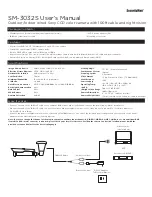
21
•
Keep stoves, fireplaces, chimneys, and barbecue grills grease free. Make sure they are
properly installed and away from any combustible materials.
•
Keep portable heaters and open flames such as candles away from combustible
materials.
•
Do not allow rubbish to accumulate.
4.
Develop a family escape plan and practice it with your entire family. Be sure to include
small children in your practice.
•
Draw a floor plan of your home, and find two ways to exit from each room. There
should be one way to get out of each bedroom without opening the door.
•
Explain to children what the smoke detector signal means. Teach them that they must
be prepared to leave the home by themselves if necessary. Show them how to check
to see if doors are hot before opening them. Show them how to stay close to the floor
and crawl if necessary. Show them how to use the alternate exit if the door is hot and
should not be opened.
•
Decide on a meeting place which has a safe distance from your house. Make sure that
all your children understand that they should go and wait for you there if there is a fire.
•
Hold fire drills at least every 6 months to make sure that everyone, even small children,
know what to do to escape safely.
•
Know where to go to call the Fire Service from outside your home.
•
Provide emergency equipment, such as fire extinguishers, and teach your family to use
this equipment properly.




































